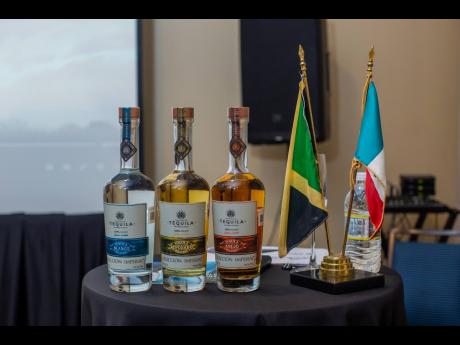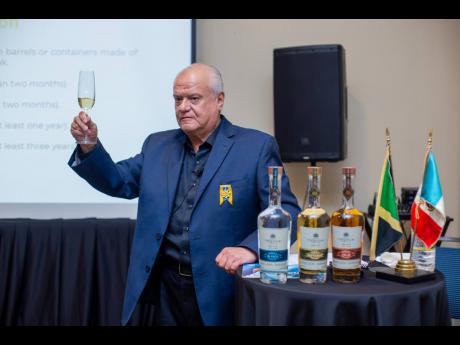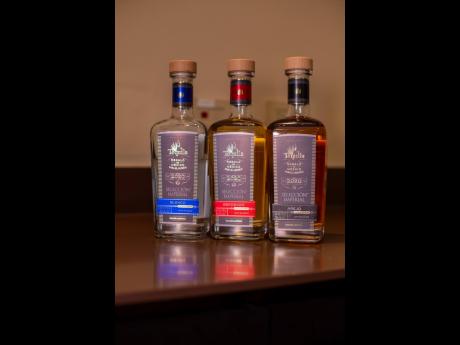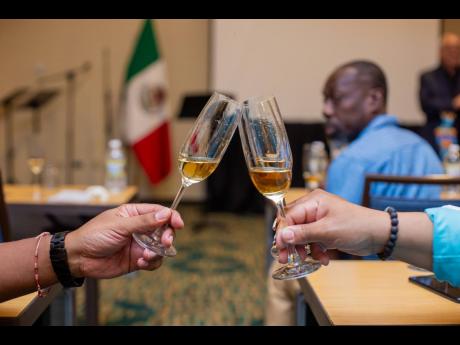Amitabh Sharma | Tequila – a Mexican cultural tradition
“It’s another tequila sunrise, starin’ slowly ‘cross the sky ...” resonates lyrics of a song by The Eagles from Los Angeles, California – their inspiration lying 1,500 miles south in Tequila, Mexico, the warmth of which touched Kingston, Jamaica, recently with the maestro – master distiller Jaime Villalobos.
“ Buenas noches señoras y señores, bienvenidos a este viaje a la tierra del Tequila (Good evening, ladies and gentlemen, welcome to this journey to the land of tequila),” Villalobos began, on the cata de Tequila. His presentation was in Spanish but, for any non-speaker, it wasn’t a blanking-out moment – his explanations flowed as smoothly as the ageing process of the brew of the evening.
So much for nostalgia – one would guess that, for a non-drinker, this is as romantic as any cocktail would make anyone else feel.
The genesis of tequila is agave, a plant that is central to Mexican culture.
“Tequila will not be there if it was not for agave,” said Juan Jose Mijares, ambassador of Mexico to Jamaica. “This plant derives its name from Greek agavos, which means admirable. So we not only enjoy tequila, we are in admiration of its existence and the joy it brings.”
The agave plant, known as Maguey in the Aztec language Nahuatl, held a central and multifaceted role in their culture and mythology. Legend has it that the goddess Mayahuel, the deity of the maguey plant, was born from the bones of the deceased, symbolising her connection to fertility and nourishment.
Agave needs anywhere between five and eight years to reach maximum sugar concentrations. During their growth period, the plants are subjected to barbeo tasks, that is, cutting the tips of the leaves to encourage the growth of the core of the agave, also known as piña. Growing agave is a labour of love and a tradition – it is still cultivated using traditional methods, by hand, and using methodologies that have been passed from generation to generation.
There are more than 200 varieties of agave, but only one can be used to produce tequila.
“Tequila is with Appellation of Origin which is made from the fermentation and subsequent distillation of sugars from the Agave Tequilana Weber blue variety,” said Villalobos. “This gives the drink its unique organoleptic (acting on, or involving the use of, the sense organs) characteristics.”
The Appellation of Origin for Tequila (DOT, by its acronym in Spanish) was the first to be issued in Mexico. There are references since 1943 about efforts by industrialists in the region to protect the name ‘tequila’ and obtain the exclusivity of its use. On September 27, 1974, it was granted protection which was published in the Official Gazette of the Federation.
The Appellation of Origin of Tequila offers the consumer the guarantee of authenticity of the products that bear this name, and is supported by the Official Mexican Standard (NOM-006-SCFI-2012) that contains the specifications for producing, bottling and marketing tequila.
TRADEMARK
The master distiller said tequila is not merely a drink that is, among other cultural treasures, the national pride of Mexico, but also a trademark.
“Both the tequila production process and the agave cultivation process must take place within the territory determined in the Declaration of Protection of the Appellation of Origin Tequila. For a product to bear the name tequila, its production must be carried out in strict compliance with the Official Mexican Standard for Tequila,” Villalobos said.
He informed that there are two categories, tequila and tequila 100 per cent agave. Tequila is made from a mixture of sugars in which at least 51 per cent must come from the Agave Tequilana Weber blue variety, while the remaining 49 per cent can originate from other natural sources of sugar that are not from the agave. The Tequila 100 per cent Agave has to be made solely from sugars from the Agave Tequilana Weber blue variety.
Villalobos took guests through the journey of savouring the brew – cata de Tequila – delving into the intricate process of pouring, swirling, smelling, then sipping it ... . “The way to do it [drink the tequila] is to swish it in your mouth, and sip it – that way you will be able to taste all the flavour profiles,” he said.
Like the transition of the sun from dawn to dusk, the colour and the flavour of tequila changes. The varieties, Villalobos explained, are: silver (b lanco o plata) – product obtained from distillation, it can be matured for less than two months in barrels; gold (j oven u oro) – mixture of silver tequila with one that has been matured; aged (reposado) – subject to a maturation process of at least two months in contact with oak containers; extra aged (añejo) – matured for at least one year in oak or encino barrels; an ultra aged (extra añejo) – matured for at least three years in oak or encino barrels.
The evening at Courtyard by Mariott hotel in New Kingston was topped off by a selection of music by Mexico City-based Chill n Go ensemble – when there is tequila, mariachi can’t be far behind.
“We thank you [the guests] for accompanying us on this journey of tequila, a round of applause for all of you,” said Mijares.
“And not to forget those who don’t drink, we respect you too ...,” that was the proverbial cherry on the top to conclude the evening.
Background information courtesy of Embassy of Mexico in Jamaica and Jaime Villalobos. amitabh.sharma@gleanerjm.com; X, formerly Twitter: amitabhs.






